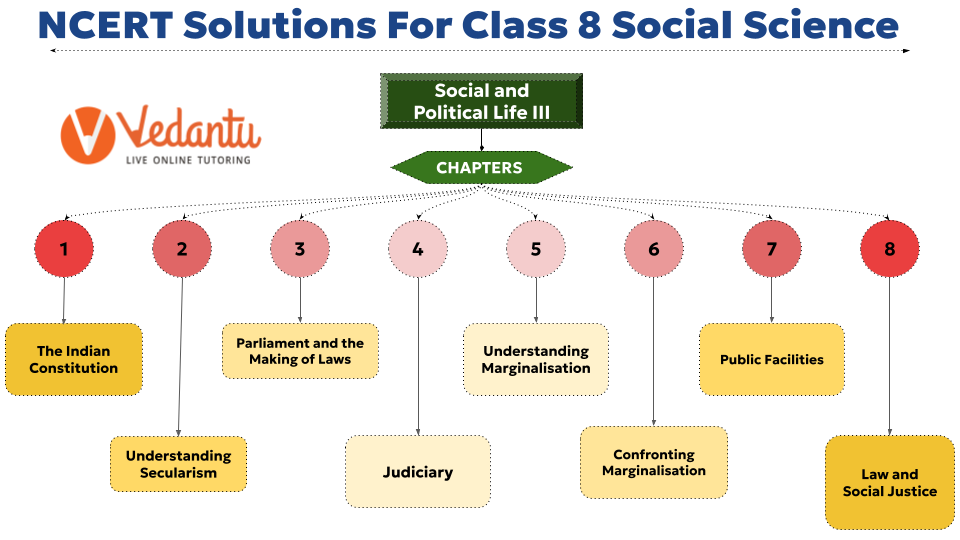Chapter-wise Class 8 Social Science Social And Political Life Questions and Answers Free PDF Download
FAQs on NCERT Solutions For Class 8 Social Science (2025-26)
1. Where can I find reliable and correct answers for all the exercises in the NCERT Class 8 Social and Political Life textbook?
You can find comprehensive and accurate NCERT Solutions for every chapter of the Class 8 Social and Political Life textbook on Vedantu. These solutions are prepared by subject matter experts and are fully aligned with the latest CBSE 2025-26 syllabus, providing a step-by-step guide to solving every question.
2. Why is it important to use NCERT Solutions for preparing for the Class 8 Social Science exam?
Using NCERT Solutions is crucial because they provide CBSE-prescribed answer formats and methodologies. They help clarify complex concepts like secularism, the functions of parliament, and the judicial system. Following these solutions ensures you not only understand the material but also learn how to present your answers effectively in exams to score better marks.
3. How do the NCERT Solutions for Class 8 Civics explain the key features of the Indian Constitution from Chapter 1?
The NCERT Solutions for Chapter 1, 'The Indian Constitution,' break down the answers in a structured manner. They guide you on how to answer questions by explaining each key feature with clarity. This includes:
- Defining concepts like Federalism and Parliamentary Form of Government.
- Explaining the Separation of Powers among the legislature, executive, and judiciary.
- Detailing the Fundamental Rights guaranteed to citizens.
4. Why do the NCERT Solutions provide answers in a step-by-step format instead of just giving the final answer?
A step-by-step format is essential for learning the correct methodology for framing answers, which is a key evaluation criterion for CBSE. For subjects like Social and Political Life, this approach helps you understand how to build an argument, cite relevant points, and structure your answer logically, especially for questions on topics like 'Understanding Marginalisation'. This ensures you can apply the same logic to different questions in your exam.
5. How can I use the NCERT Solutions to write a better answer about the structure and functions of the Indian Parliament?
The solutions demonstrate the ideal way to structure this answer. They guide you to first define the Indian Parliament (consisting of the President, the Lok Sabha, and the Rajya Sabha). Then, they provide separate, clear points on its key functions, such as law-making, controlling the government, and financial control. By following this model, you learn to present information clearly and cover all necessary points for full marks.
6. Do the NCERT Solutions for Class 8 Social and Political Life cover the entire syllabus for the 2025-26 session?
Yes, the solutions are updated to cover all chapters prescribed in the latest NCERT textbook for the 2025-26 academic year. This includes all units, from 'The Indian Constitution' and 'Understanding Secularism' to 'The Judiciary,' 'Public Facilities,' and 'Law and Social Justice,' ensuring complete and relevant exam preparation.
7. How do the NCERT Solutions help clarify the difference between the roles of the Police and the Judiciary?
The solutions clarify this common point of confusion by providing precise, distinct answers to textbook questions. They explain that the role of the Police is to investigate a crime and file a chargesheet, while the role of the Judiciary is to conduct a fair trial, examine evidence, and impartially deliver a verdict. The solutions use examples from the chapter 'The Judiciary' to make this distinction clear.
8. What is the correct method for answering a question on 'Law and Social Justice' using the NCERT Solutions as a guide?
The solutions guide you to use a three-part structure. First, introduce the law in question (e.g., the Minimum Wages Act). Second, explain its purpose and the government's role in its enforcement. Finally, use textbook examples, like the Bhopal Gas Tragedy, to illustrate the critical importance of such laws. This structured answering method, demonstrated in the solutions, helps in crafting a comprehensive and high-scoring answer.
9. Can using NCERT Solutions for Class 8 Political Science help with both homework and final exam preparation?
Absolutely. For homework, the solutions provide accurate and well-explained answers, ensuring concept clarity. For exam preparation, consistently referring to them helps you master the CBSE answer-writing pattern, learn key terminology, and understand how to tackle various question types, from definitions to analytical questions, as per the 2025-26 exam format.

























